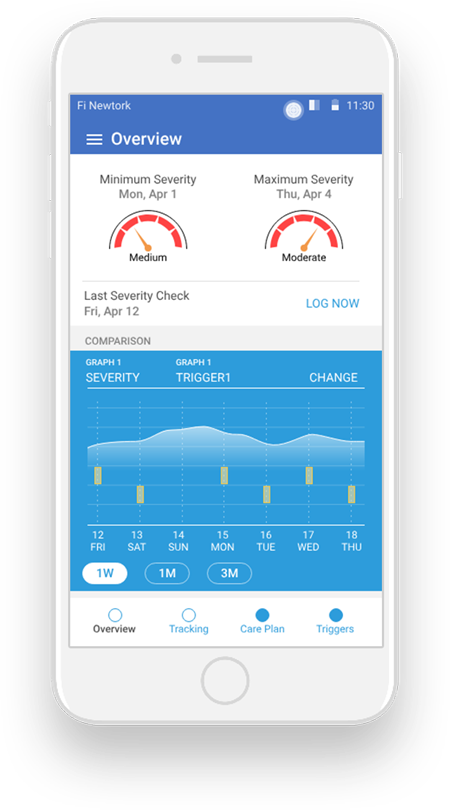Eczema Allergy Test

Table of contents
- Introduction
- What is eczema?
- What is an allergic reaction?
- Why do only some people develop allergies?
- Allergy test
- Types of Allergy test
- Conclusion
Introduction
Allergic disorders are increasing across the world and currently affects up to 40% of the population. Eczema is a chronic skin condition which is associated with allergies. Many parents think that knowing the allergens through eczema allergy test will help to prevent eczema flares. Will it be actually beneficial? Read on to find our more on eczema and eczema allergy testing.
What is eczema?
Eczema also known as atopic dermatitis is a chronic, inflammatory skin condition. Symptoms of eczema include dry, itchy skin with red rashes. You may have several flare ups of eczema throughout life. It can immensely affect the quality of life. Eczema is a common skin condition worldwide. According to research, it may affect up to 30% of children and some of them will continue to have eczema in to adulthood. Eczema is found to be caused by an interaction of your genes and many environmental factors. Most of you will have a family history, but not everyone with eczema has a genetic link. But, if you have a sibling or a parent with eczema, there is a higher chance for you to develop eczema. So, allergy testing for eczema in adults is what needed.
An eczema flare is triggered by environmental factors. These triggers include;
- Irritants and chemicals – soap, detergents, cosmetics, perfume, cleaning products, formaldehyde
- Cold air
- Cigarette smoke
- Hot weather and heat
- Airborne allergens – dust, pollen
- Out- door pollutants
- Certain fabrics – polyester, wool
- Certain metals –nickel
You may notice that only some of these triggers are allergic substances.
What is an allergic reaction?
An allergic reaction is an immune response that occurs in our body to a substance to which we are already sensitized. This allergic substance causing the allergic reaction is known as an allergen. An allergen can be anything such as dust, pollen, animal dander, chemicals and certain foods. An allergen which can sensitize certain individuals to cause over reaction by their bodies, may be harmless to others who are not sensitized. It is strongly recommended for allergy testing for eczema in adults.
Why do only some people develop allergies?
It is still unclear why some people get allergies and others don’t. Having a family history may make a child more prone to develop allergic diseases, although not all allergies of parents are passed on to the offspring. But you as parents may pass on the predisposition to allergic diseases. So your child may develop an allergic reaction of some sort such as eczema or hay fever. These genetically predisposed people are known as atopic individuals. The families are called atopic families. These allergic disorders may even coexist. We should also consider allergy testing for eczema in adults.
Ex: babies with eczema have a higher chance of developing food allergies
Our skin is a protective barrier which keeps germs (bacteria, viruses and fungi) and allergens away from our bodies. If you have eczema, your skin barrier is disturbed. This will create a route for allergens to enter the body and sensitize.
Track and Manage your Eczema treatment using a comprehensive Eczema App
Download Eczemaless now
Allergy test
If your child is getting frequent flares of eczema, you may wonder whether the flares would stop, provided you know what causes the eczema and the allergens responsible. Many parents inquire about eczema allergy testing for children with eczema. However, only some children with eczema will benefit from allergy testing.
Dermatologists believe that all children with eczema do not need allergy testing. This is because;
- The most effective way to clear a flare up of eczema is to adhere to the eczema management plan given by your doctor. This will include how the child should be given baths, applying emollients (moisturizers) and using eczema medicines like topical steroids when needed. There are many factors which trigger an eczema flare and not only one allergen. You should help your child to avoid these triggers that leads to his or her eczema.
Triggers can be allergic in nature but most often they can be non-allergic and include irritants, stress, heat, soap, sweating, weather changes, tiredness and a respiratory infection. So, it is only sometimes that eczema allergy tests will help to improve your child’s eczema.
- You should not limit yourself to avoiding allergens because doing only that will not clear a flare up of eczema.
- Although allergy shots can be given, they are not proven to help an eczema flare. However, allergy shots given to treat lung allergies may have an effect on reducing eczema.
Here are some signs you should discuss with your child’s dermatologist about allergy testing.
- Despite following the eczema management plan given by the dermatologist for few weeks, still the eczema remains the same or the improvement is seen only slightly.
- The growth expected in your child is not happening satisfactorily.
- If you notice that each time your child is given a certain food, the eczema gets a flare up. However you should remove these foods from your child’s diet only if the reaction is severe or if the dermatologists requests.
Types of allergy tests
- Patch test
Substances that your child is allergic to are applied to discs. Each disc will contain a different allergen. These discs are taped to your child’s skin at the back. The skin should be free from eczema before the test. Your dermatologist will examine your child’s skin at specific times to look for reactions.
- Skin prick test
Small amounts of the substances that your child is allergic to will be placed on your child’s skin. It can be done on the skin of the forearm or back. Then the skin is pricked or scratched. Your doctor will check for reaction on the skin at specific times.
- Food challenge test
A blood test or a skin prick test will tell what food allergies your child doesn’t have.
The blood test will tell whether your child has antibodies in their blood which may react to common substances and lead to allergic reactions. Blood test will help to confirm a suspicion of an immediate air borne or food allergy.
During one of these tests, if your child has a positive reaction to a food, the results need to be confirmed with another type of test. This is referred to as a food challenge. There are many different types of food challenges. If this test is decided for your child, your dermatologist will discuss what to expect.
Conclusion
Allergies are more common in children with eczema than in children who do not have it. So, if you think whether your child is reacting to something, an allergic test may be helpful. An eczema allergy test can be performed to determine allergens. Although parents believe that removing the allergic cause would clear their child’s eczema, unfortunately it is not that simple. It is quite rare for childhood eczema to clear even after removing or reducing the exposure of the possible allergen.
References:
- https://eczema.org/information-and-advice/triggers-for-eczema/allergy-and-eczema/
- https://eczema.org/information-and-advice/triggers-for-eczema/allergy-and-eczema/
- http://www.nottinghameczema.org.uk/documents/allergy-tests-for-atopic-eczema.pdf
GET IN CONTROL OF YOUR ECZEMA
Use our AI tool to check the severity of Eczema and keep track of your Eczema progress.



